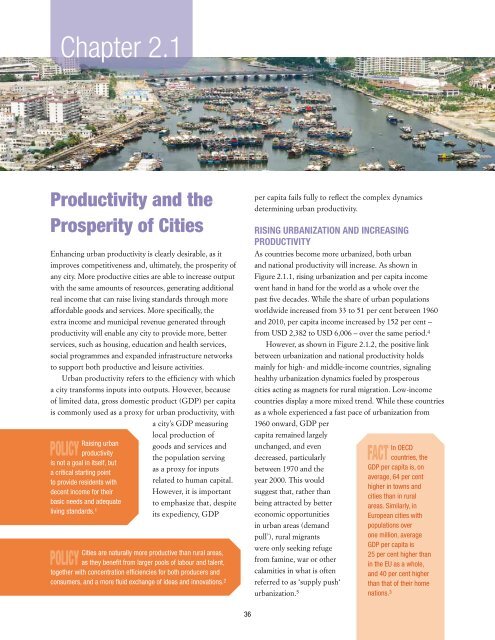state of the world's cities 2012/2013 - United Nations Sustainable ...
state of the world's cities 2012/2013 - United Nations Sustainable ...
state of the world's cities 2012/2013 - United Nations Sustainable ...
Create successful ePaper yourself
Turn your PDF publications into a flip-book with our unique Google optimized e-Paper software.
Chapter 2.1Productivity and <strong>the</strong>Prosperity <strong>of</strong> CitiesEnhancing urban productivity is clearly desirable, as itimproves competitiveness and, ultimately, <strong>the</strong> prosperity <strong>of</strong>any city. More productive <strong>cities</strong> are able to increase outputwith <strong>the</strong> same amounts <strong>of</strong> resources, generating additionalreal income that can raise living standards through moreaffordable goods and services. More specifically, <strong>the</strong>extra income and municipal revenue generated throughproductivity will enable any city to provide more, betterservices, such as housing, education and health services,social programmes and expanded infrastructure networksto support both productive and leisure activities.Urban productivity refers to <strong>the</strong> efficiency with whicha city transforms inputs into outputs. However, because<strong>of</strong> limited data, gross domestic product (GDP) per capitais commonly used as a proxy for urban productivity, witha city’s GDP measuringlocal production <strong>of</strong>Raising urban goods and services andpolicy productivity<strong>the</strong> population servingis not a goal in itself, buta critical starting pointas a proxy for inputsto provide residents with related to human capital.decent income for <strong>the</strong>irHowever, it is importantbasic needs and adequate to emphasize that, despiteliving standards. 1its expediency, GDPpolicyCities are naturally more productive than rural areas,as <strong>the</strong>y benefit from larger pools <strong>of</strong> labour and talent,toge<strong>the</strong>r with concentration efficiencies for both producers andconsumers, and a more fluid exchange <strong>of</strong> ideas and innovations. 2per capita fails fully to reflect <strong>the</strong> complex dynamicsdetermining urban productivity.Rising Urbanization and IncreasingProductivityAs countries become more urbanized, both urbanand national productivity will increase. As shown inFigure 2.1.1, rising urbanization and per capita incomewent hand in hand for <strong>the</strong> world as a whole over <strong>the</strong>past five decades. While <strong>the</strong> share <strong>of</strong> urban populationsworldwide increased from 33 to 51 per cent between 1960and 2010, per capita income increased by 152 per cent –from USD 2,382 to USD 6,006 – over <strong>the</strong> same period. 4However, as shown in Figure 2.1.2, <strong>the</strong> positive linkbetween urbanization and national productivity holdsmainly for high- and middle-income countries, signalinghealthy urbanization dynamics fueled by prosperous<strong>cities</strong> acting as magnets for rural migration. Low-incomecountries display a more mixed trend. While <strong>the</strong>se countriesas a whole experienced a fast pace <strong>of</strong> urbanization from1960 onward, GDP percapita remained largelyunchanged, and evenIn OECDdecreased, particularly FACT countries, <strong>the</strong>between 1970 and <strong>the</strong>GDP per capita is, onyear 2000. This wouldaverage, 64 per centhigher in towns andsuggest that, ra<strong>the</strong>r than<strong>cities</strong> than in ruralbeing attracted by betterareas. Similarly, ineconomic opportunitiesEuropean <strong>cities</strong> within urban areas (demandpopulations overpull’), rural migrantsone million, averagewere only seeking refugeGDP per capita is25 per cent higher thanfrom famine, war or o<strong>the</strong>rin <strong>the</strong> EU as a whole,calamities in what is <strong>of</strong>ten and 40 per cent higherreferred to as ‘supply push‘ than that <strong>of</strong> <strong>the</strong>ir homeurbanization. 5nations. 336





